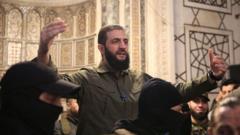In the wake of the recent upheaval in Syria, Abu Mohammed al-Jawlani, the leader of the militant group Hayat Tahrir al-Sham (HTS), has publicly distanced himself from his jihadist roots. With the fall of Bashar al-Assad appearing imminent, al-Jawlani has adopted his real name, Ahmed al-Sharaa, signaling a significant shift in identity as he seeks to establish legitimacy among the Syrian populace. This transformation comes as HTS leads the charge to secure control over Damascus and other territories.
Al-Jawlani's evolution into a statesman is not a sudden development but rather a calculated progression over several years. His public persona has transitioned from a traditional jihadist militant to one donning military fatigues, reflecting his leadership role in ongoing operations. Notably, his background includes ties with prominent extremist organizations, such as al-Qaeda, and an early association with the Islamic State via its predecessor, al-Qaeda in Iraq. After being sent to Syria by Abu Bakr al-Baghdadi in 2011, al-Jawlani established the al-Nusra Front, which later splintered amidst internal conflicts with ISIS.
Over the years, al-Jawlani strategically rebranded his group, continuously aiming to reduce violent connotations associated with extremist movements. In 2016, he severed ties with al-Qaeda and revamped al-Nusra Front as Jabhat Fatah al-Sham, followed by Hayat Tahrir al-Sham in 2017. This rebranding effort came with the intent to bolster his group's acceptability within Syria and outside, particularly as HTS emerged as a dominant force in Idlib, the country’s largest rebel stronghold.
To consolidate power in northern Syria, HTS established a "Syrian Salvation Government" to operate as a civil administration, claiming to provide governance and services. Al-Jawlani, aware of the perception challenges his group faces, engaged closely with civilians, focusing on humanitarian efforts, especially following the catastrophic earthquakes of 2023. HTS has portrayed itself as a model of governance capable of balancing jihadist and political aspirations, emulating the Taliban's approach to power.
However, despite these efforts, HTS has faced allegations of authoritarianism and suppression of dissent, drawing comparisons to Assad's regime. As protests emerged in Idlib, the organization's critics accused it of stifling opposition and maintaining a façade of moderation. In light of this, HTS has initiated some reforms, though skeptics argue that such measures merely serve to contain dissent rather than create genuine change.
As military operations intensified against Assad's regime, al-Jawlani’s shift in focus towards pragmatic governance becomes increasingly pivotal. While challenges remain—especially from various factions and hardline critics—al-Jawlani appears resolute in solidifying his leadership amid rapid changes. His ability to navigate the complexities of Syrian politics could not only redefine HTS's trajectory but may also inspire a transformation within jihadist movements overall, potentially marking a shift toward localized, politically adaptable strategies rather than rigid ideologies.
Al-Jawlani's evolution into a statesman is not a sudden development but rather a calculated progression over several years. His public persona has transitioned from a traditional jihadist militant to one donning military fatigues, reflecting his leadership role in ongoing operations. Notably, his background includes ties with prominent extremist organizations, such as al-Qaeda, and an early association with the Islamic State via its predecessor, al-Qaeda in Iraq. After being sent to Syria by Abu Bakr al-Baghdadi in 2011, al-Jawlani established the al-Nusra Front, which later splintered amidst internal conflicts with ISIS.
Over the years, al-Jawlani strategically rebranded his group, continuously aiming to reduce violent connotations associated with extremist movements. In 2016, he severed ties with al-Qaeda and revamped al-Nusra Front as Jabhat Fatah al-Sham, followed by Hayat Tahrir al-Sham in 2017. This rebranding effort came with the intent to bolster his group's acceptability within Syria and outside, particularly as HTS emerged as a dominant force in Idlib, the country’s largest rebel stronghold.
To consolidate power in northern Syria, HTS established a "Syrian Salvation Government" to operate as a civil administration, claiming to provide governance and services. Al-Jawlani, aware of the perception challenges his group faces, engaged closely with civilians, focusing on humanitarian efforts, especially following the catastrophic earthquakes of 2023. HTS has portrayed itself as a model of governance capable of balancing jihadist and political aspirations, emulating the Taliban's approach to power.
However, despite these efforts, HTS has faced allegations of authoritarianism and suppression of dissent, drawing comparisons to Assad's regime. As protests emerged in Idlib, the organization's critics accused it of stifling opposition and maintaining a façade of moderation. In light of this, HTS has initiated some reforms, though skeptics argue that such measures merely serve to contain dissent rather than create genuine change.
As military operations intensified against Assad's regime, al-Jawlani’s shift in focus towards pragmatic governance becomes increasingly pivotal. While challenges remain—especially from various factions and hardline critics—al-Jawlani appears resolute in solidifying his leadership amid rapid changes. His ability to navigate the complexities of Syrian politics could not only redefine HTS's trajectory but may also inspire a transformation within jihadist movements overall, potentially marking a shift toward localized, politically adaptable strategies rather than rigid ideologies.
















